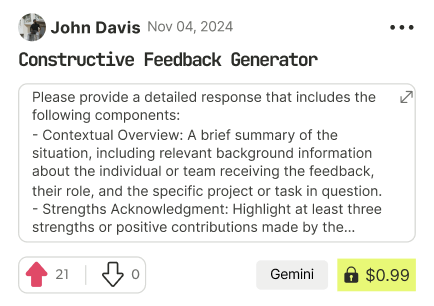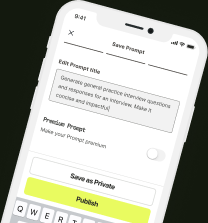prompt mine App
Find, Create & Share AI Magic
**Unlocking Your Brain's Learning Superpowers: A 30-Day Accelerated Learning Plan**
Okay, let's unlock your learning potential! I'll act as your personal neuroscience-based learning coach.
First, let's address the "learning style" concept. While the traditional VARK (Visual, Auditory, Reading/Writing, Kinesthetic) model is popular, the scientific evidence supporting its effectiveness in improving learning outcomes is weak. Instead, we'll focus on evidence-based techniques that work for all brains, but we'll tailor the application of those techniques based on your preferences.
To get a sense of your preferred input methods (not a rigid "style"), consider these questions. Answer quickly, don't overthink:
1. When you meet someone new, what do you remember most easily: their face (visual), their name (auditory), or the interaction/feeling you had (kinesthetic)?
2. If you need to assemble furniture, do you prefer to look at diagrams (visual), listen to instructions (auditory), read the manual (reading/writing), or just start putting it together (kinesthetic)?
3. When learning something new, do you prefer to watch a demonstration (visual), hear an explanation (auditory), read about it (reading/writing), or try it yourself (kinesthetic)?
Based on your responses, you'll likely lean towards one or two of these. This doesn't mean you only learn that way, but it suggests how you might prefer to initially engage with new material. We'll use this to customize your plan. Let's assume, for the sake of creating a detailed plan, that you have a slight preference for visual and kinesthetic learning. I'll adjust examples accordingly, but you can adapt them based on your actual preferences.
Part 1: Learning 3x Faster with Brain Hacks
These aren't "hacks" in the sense of shortcuts that bypass effort, but rather scientifically-backed strategies that optimize your brain's natural learning processes:
1. Spaced Repetition: This is the single most powerful technique. Instead of cramming, you review information at increasing intervals. This leverages the "forgetting curve" to strengthen memory consolidation. Tools like Anki (free, open-source flashcard software) are excellent for this.
Brain Hack: Spaced repetition strengthens synaptic connections, making recall easier and faster over time.
2. Interleaving: Mix up different subjects or skills during your study sessions. Don't just study "Topic A" for hours, then "Topic B." Instead, do A-B-A-C-B-A. This forces your brain to work harder to retrieve information, leading to better long-term retention.
Brain Hack: Interleaving enhances discriminative contrast – your brain learns to distinguish between similar concepts more effectively.
3. Active Recall: Don't just passively reread notes. Test yourself frequently. Try to retrieve the information from memory before looking at the answer. This strengthens neural pathways and identifies knowledge gaps.
Brain Hack: Active recall utilizes the testing effect, demonstrating that retrieval practice is far more effective than restudying.
4. Elaboration: Don't just memorize; understand. Connect new information to what you already know. Ask yourself "why" questions. Explain the concept to yourself or someone else in your own words.
Brain Hack: Elaboration creates richer, more interconnected neural networks, making information more meaningful and memorable.
5. Dual Coding: Combine verbal information with visual aids. Draw diagrams, mind maps, or use images. This leverages both your verbal and visual processing systems.
Brain Hack: Dual coding creates multiple retrieval pathways, increasing the chances of remembering the information.
6. Chunking: Break down complex information into smaller, manageable "chunks." This reduces cognitive load and makes it easier to process and remember.
Brain Hack: Chunking leverages the limited capacity of working memory, allowing you to handle more information effectively.
7. Mindfulness and Focus: Minimize distractions. Practice focused attention. Short bursts of intense focus (e.g., 25-minute Pomodoro sessions) followed by short breaks are more effective than long, unfocused sessions.
Brain Hack: Focused attention strengthens the prefrontal cortex, improving executive functions like working memory and cognitive control.
8. Sleep: Consolidate learning. Memories are consolidated during sleep, particularly during slow-wave sleep (SWS) and rapid eye movement (REM) sleep. Aim for 7-9 hours of quality sleep.
Brain Hack: Sleep clears out metabolic waste products that build up during the day, and strengthens synaptic connections formed during learning.
9. Exercise: Boost brainpower. Regular physical activity increases blood flow to the brain, improves neuroplasticity, and enhances cognitive function.
Brain Hack: Exercise stimulates the release of brain-derived neurotrophic factor (BDNF), a protein that promotes the growth and survival of neurons.
10. Nutrition: Fuel your brain. A healthy diet rich in fruits, vegetables, and omega-3 fatty acids supports optimal brain function.
Brain Hack: Proper nutrition provides the building blocks for neurotransmitters and supports overall brain health.
Part 2: Retaining Information for Life (Not Just Tests)
The techniques above, when consistently applied, are the key to long-term retention. However, there are a few additional principles to emphasize:
1. Meaning and Relevance: The more meaningful and relevant information is to you, the more likely you are to remember it. Connect what you're learning to your personal interests, goals, and experiences.
2. Use It or Lose It: Regularly use the information you've learned. Apply it in real-world situations, teach it to others, or incorporate it into your daily life.
3. Emotional Connection: Information associated with strong emotions is more likely to be remembered. Try to create positive learning experiences and find ways to make the material engaging and enjoyable.
4. Storytelling: Frame information in a way that is relatable. Using stories, examples, and personal experiences.
Part 3: Turning Learning into a Superpower
Learning becomes a superpower when it's not just about acquiring knowledge, but about transforming yourself and solving problems. Here's how:
1. Metacognition: Become aware of your own learning process. Reflect on what works best for you, identify your strengths and weaknesses, and adjust your strategies accordingly.
2. Growth Mindset: Embrace challenges and view mistakes as opportunities for learning. Believe in your ability to learn and improve.
3. Lifelong Learning: Cultivate a love of learning and a curiosity about the world. Make learning a continuous, lifelong pursuit.
4. Application: Don't just learn for the sake of learning. Apply your knowledge to solve problems, create new things, and make a positive impact on the world.
5. Teach Others: The best way to truly learn and integrate new information.
Part 4: Your 30-Day Accelerated Learning Plan (Visual/Kinesthetic Focus)
Let's assume you're learning a new programming language, Python, as an example. You can adapt this plan to any subject.
Week 1: Foundations & Active Engagement
Days 1-3: Basics & Setup (Visual & Kinesthetic Emphasis)
Watch introductory Python videos (visual). Focus on the flow of code, not just memorizing syntax.
Immediately after each video, type out the code yourself (kinesthetic). Don't just copy; try to understand each line.
Use an interactive coding environment like Jupyter Notebook or Google Colab (kinesthetic). Experiment!
Create simple visual diagrams (e.g., flowcharts) to represent code logic (visual).
Start an Anki deck with basic concepts (data types, variables, operators). Review daily (spaced repetition).
Days 4-7: Control Flow & Functions (Active Recall & Elaboration)
Watch videos on conditional statements (if/else) and loops (for/while) (visual).
After each video, write your own examples from scratch, testing different scenarios (kinesthetic, active recall).
Draw flowcharts for each example (visual).
Explain the concepts to yourself out loud, as if teaching a beginner (elaboration).
Add new concepts to your Anki deck.
Start a small project: e.g., a simple calculator or text-based game (kinesthetic, application).
Week 2: Data Structures & Problem Solving
Days 8-14:
Learn about lists, dictionaries, and tuples (visualize them as containers).
Practice manipulating these data structures with hands-on exercises (kinesthetic).
Solve coding challenges on websites like HackerRank or LeetCode (active recall, problem-solving).
Break down complex problems into smaller, manageable chunks (chunking).
Continue using Anki and your mini-project.
Join an online Python community (e.g., on Reddit or Stack Overflow) to ask questions and see how others approach problems.
Week 3: Modules & Intermediate Concepts
Days 15-21:
Learn about importing and using modules (e.g., random, math, datetime).
Explore the documentation for each module (reading/writing, but make it active: try out the examples in the documentation).
Work on a more complex project that utilizes multiple modules (e.g., a simple data analysis script or a web scraper).
Continue with Anki, focusing on areas where you're struggling.
Try to explain the functionality of your code to someone else (even if they don't know programming – the act of explaining helps you solidify your understanding).
Week 4: Advanced Concepts & Consolidation
Days 22-28:
Explore more advanced topics like object-oriented programming (OOP) or file handling.
Visualize OOP concepts with diagrams (visual).
Build a larger project that incorporates these advanced concepts (kinesthetic).
Refactor your previous projects, improving their efficiency and readability.
Continue with Anki, focusing on long-term retention.
Consider contributing to an open-source Python project (application, real-world experience).
Days 29-30: Review & Reflection
Review your Anki deck comprehensively.
Reflect on your learning journey. What were the most effective techniques? What challenges did you face? How can you improve your learning process in the future? (metacognition)
Plan your next learning project.
Throughout the 30 Days:
Prioritize Sleep: Aim for 7-9 hours of quality sleep each night.
Stay Active: Incorporate regular physical activity into your routine.
Stay Hydrated: Drink plenty of water.
Take Breaks: Use the Pomodoro Technique or similar methods to maintain focus.
Minimize Distractions: Create a dedicated learning environment.
Seek Feedback: Ask for feedback on your code and your learning process.
This is a template. The most important thing is to be actively engaged with the material, test yourself regularly, and consistently apply the principles of spaced repetition, interleaving, and elaboration. Adjust the plan based on your progress and preferences. Good luck, and enjoy the journey of becoming a learning master!

Find Powerful AI Prompts
Discover, create, and customize prompts with different models, from ChatGPT to Gemini in seconds

Simple Yet Powerful
Start with an idea and use expert prompts to bring your vision to life!

